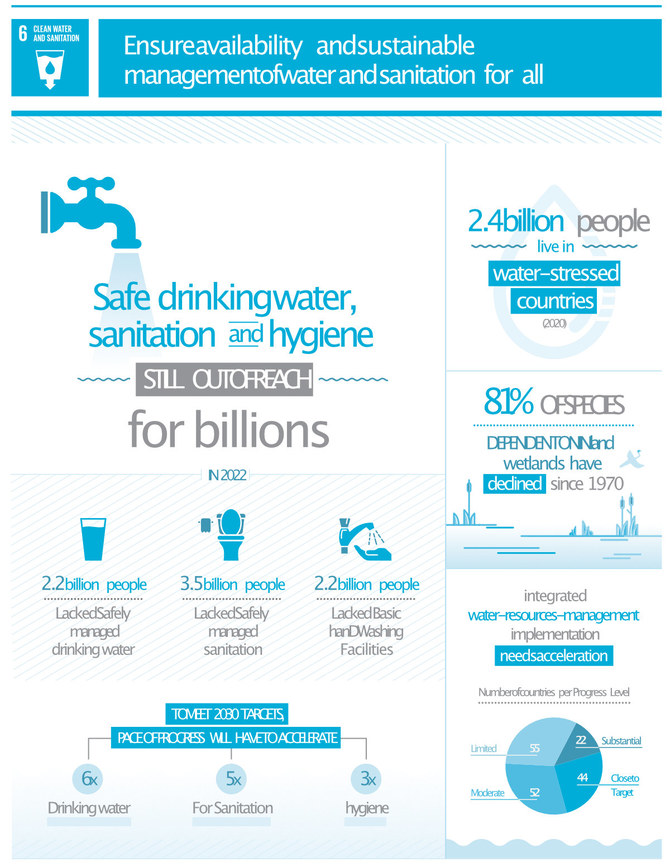Time running out for world to meet water security targets

https://arab.news/wfnk8
The world has six years left to go until the 2030 deadline set by the UN to achieve the Sustainable Development Goals. Unfortunately, the global community today finds itself confronting an unsettling reality — a shortfall in terms of meeting critical targets, especially in the realm of water-related goals. It is imperative that nations unite, accelerate their efforts and undertake substantial measures to ensure water security on a global scale.
It is important to point out that the ramifications of falling short in this pivotal area extend far beyond the environmental domain, including permeating into the economic, social and geopolitical dimensions. The urgency of addressing water-related challenges cannot be overstated. A reevaluation of our strategies and commitment to transformative action is necessary.
At the heart of the SDGs lies Goal 6: clean water and sanitation, which is a testament to the international community’s recognition of the centrality of water to sustainable development. Yet, as the 2030 deadline looms, progress in achieving the water-related targets has been uneven and, in many instances, insufficient.
Access to clean water remains a distant reality for millions, with disparities exacerbated by factors such as poverty, gender and regional inequalities.
First and foremost, the global community must acknowledge the fact that the quest for water security extends beyond installing pipelines and coming up with new purifying techniques. It also requires a comprehensive understanding of the multifaceted challenges that are intertwined with water scarcity, pollution and inadequate sanitation. Water security, in practical terms, transcends the mere availability of water; it encompasses equitable access, efficient management and the preservation of water ecosystems.
As a result, bridging the gap in access to clean water demands targeted interventions in regions where communities grapple with the daily struggle for survival due to inadequate water sources.
Some regions and countries facing significant water insecurity include sub-Saharan Africa (nations like Somalia and Sudan and parts of the Sahel region), the Middle East and North Africa (countries such as Yemen and Jordan and parts of North Africa), South Asia (including India, Pakistan and Bangladesh) and some countries in Central Asia, such as Uzbekistan, Turkmenistan and parts of Kazakhstan.
It is imperative to place a greater focus on infrastructural investments and innovative technologies. Community engagement initiatives that empower local populations to take ownership of their water resources are also critical.
Secondly, it should be noted that water management strategies must evolve to meet the demands of a changing climate and burgeoning populations. This involves not only optimizing existing water sources, but also exploring sustainable alternatives such as rainwater harvesting, wastewater recycling and desalination technologies.
In fact, smart water management, augmented by data-driven technologies and real-time monitoring, can enhance efficiency, minimize losses and contribute to the sustainable utilization of this finite resource.
It is imperative to place a greater focus on infrastructural investments and innovative technologies.
Dr. Majid Rafizadeh
The third significant issue is the role of diplomacy in addressing this important crisis, as the pursuit of water security extends beyond national borders. Transboundary water issues have become increasingly prevalent, posing challenges that require collaborative and diplomatic solutions.
As a result, shared water resources demand cooperative frameworks, the fostering of trust and equitable agreements between neighboring nations. International organizations can play a crucial role in facilitating dialogue and brokering agreements, emphasizing the interconnectedness of water security with broader geopolitical stability.
Fourth, addressing water-related goals also entails tackling interconnected issues such as pollution, a silent assailant that is threatening the quality of our water sources. Industrial discharge, agricultural runoff and inadequate waste management systems have led to the contamination of rivers, lakes and aquifers, jeopardizing ecosystems and endangering human health.
An effective way to tackle this issue would be through stringent regulations, robust enforcement mechanisms and a paradigm shift toward sustainable practices in agriculture and industry. The “polluter pays” principle should be upheld; this incentivizes industries to adopt ecofriendly technologies and practices.
Another interconnected issue is sanitation, which remains an Achilles’ heel in the global pursuit of clean water. Poor sanitation can lead to a cycle of waterborne diseases, poverty and hindered socioeconomic progress.
Comprehensive sanitation solutions require education, awareness campaigns and behavioral change initiatives that dispel cultural taboos surrounding sanitation practices. Gender-sensitive approaches are crucial, recognizing the disproportionate impact of inadequate sanitation on women and girls.
As the international community recalibrates its strategies to expedite progress on water-related goals, financial commitments emerge as a linchpin. The transformational change needed to secure clean water for all requires substantial investments in infrastructure, technology and capacity-building. Governments, international institutions and the private sector must collaborate to mobilize resources and create innovative financing mechanisms that ensure sustained investment in water security projects.
Educating the public and fostering a sense of water consciousness is equally imperative. Public awareness campaigns can cultivate a culture of responsible water use, encouraging individuals to adopt water-saving practices in their daily lives.
Last but not least, education programs, particularly in schools, can instill an understanding of the intrinsic value of water and the broader implications of its scarcity.
In conclusion, the imperative to expedite efforts toward achieving water security globally is not merely an environmental concern, but a moral and pragmatic necessity. The consequences of inaction are profound — encompassing health crises, economic setbacks and social upheaval. The UN SDGs underscore our collective commitment to a better, more equitable world.
As we approach the deadline, the international community must rise to the occasion, reinvigorating its dedication to the principles of sustainability, cooperation and resilience. In navigating these troubled waters, we have the opportunity to forge a path toward a more secure, prosperous and sustainable future for us all.
• Dr. Majid Rafizadeh is a Harvard-educated Iranian-American political scientist. X: @Dr_Rafizadeh









































